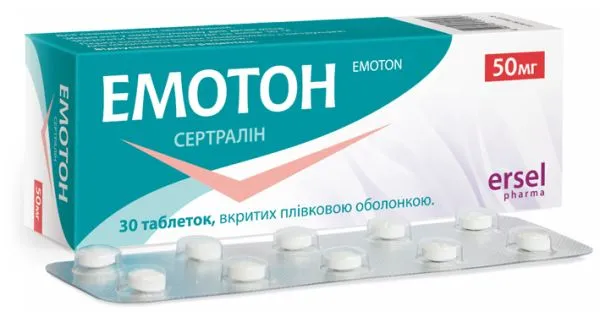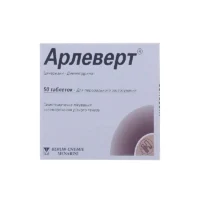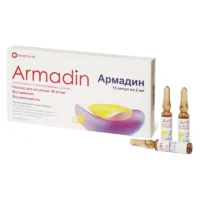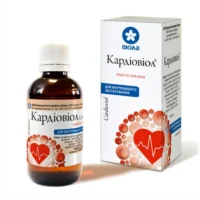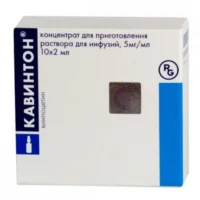Description
Emoton (Sertraline) Coated Tablets 50 mg. №30
Ingredients
Each coated tablet contains 50 mg of sertraline.
Mechanism of Action
Sertraline, the active ingredient in Emoton, is a selective serotonin reuptake inhibitor (SSRI) that works by increasing the levels of serotonin in the brain. This mechanism of action helps improve mood, sleep, appetite, and energy levels in patients with various psychiatric disorders.
Pharmacological Properties
Sertraline exerts its pharmacological effects by inhibiting the reuptake of serotonin, leading to increased levels of this neurotransmitter in the synaptic cleft. This action results in enhanced serotonergic neurotransmission, which contributes to the alleviation of symptoms associated with depression and anxiety disorders.
Indications for Use
Emoton (sertraline) is indicated for the treatment of depression, obsessive-compulsive disorder (OCD), panic disorder, post-traumatic stress disorder (PTSD), social anxiety disorder, and premenstrual dysphoric disorder (PMDD).
Contraindications
Do not use Emoton (sertraline) if you are taking monoamine oxidase inhibitors (MAOIs) or have a known hypersensitivity to sertraline. Concomitant use of sertraline with MAOIs can lead to serious and potentially life-threatening reactions.
Side Effects
Common side effects of sertraline may include nausea, diarrhea, insomnia, dizziness, and sexual dysfunction. In some cases, sertraline may also cause weight changes, dry mouth, and headaches. It is important to report any persistent or severe side effects to your healthcare provider.
Usage Instructions
The usual recommended dose of Emoton (sertraline) is 50 mg taken once daily. The tablet should be swallowed whole with water, with or without food. It is essential to adhere to the prescribed dosage and administration schedule provided by your healthcare provider.
Benefits Compared to Analogues
Emoton (sertraline) offers advantages over other antidepressants due to its favorable side effect profile and proven efficacy in the treatment of various psychiatric conditions. The tolerability and safety of sertraline make it a preferred choice for many patients and healthcare providers.
Suitable Patient Groups
Emoton (sertraline) is suitable for a wide range of patient populations, including adults, adolescents, and the elderly. However, special caution should be exercised when prescribing sertraline to children and adolescents due to the potential risk of suicidal ideation and behavior.
Storage Conditions and Shelf Life
Store Emoton (sertraline) tablets in a dry place at room temperature, away from moisture and heat. Ensure the packaging is tightly closed to protect the tablets from light and humidity. Check the expiration date on the packaging and do not use the product beyond the stated shelf life.
Packaging Description
Emoton (sertraline) is available in blister packs containing 30 coated tablets. The packaging is designed to ensure the integrity and stability of the tablets during storage and transportation. Each tablet is individually sealed to maintain its potency and quality.
Clinical Evidence and Proven Effectiveness
Clinical trials have shown the efficacy of sertraline in the treatment of depression and anxiety disorders. A study published in the Journal of Clinical Psychiatry demonstrated that sertraline was effective and well-tolerated in the long-term management of panic disorder. The evidence supports the use of Emoton (sertraline) as a valuable therapeutic option for patients with psychiatric conditions.

